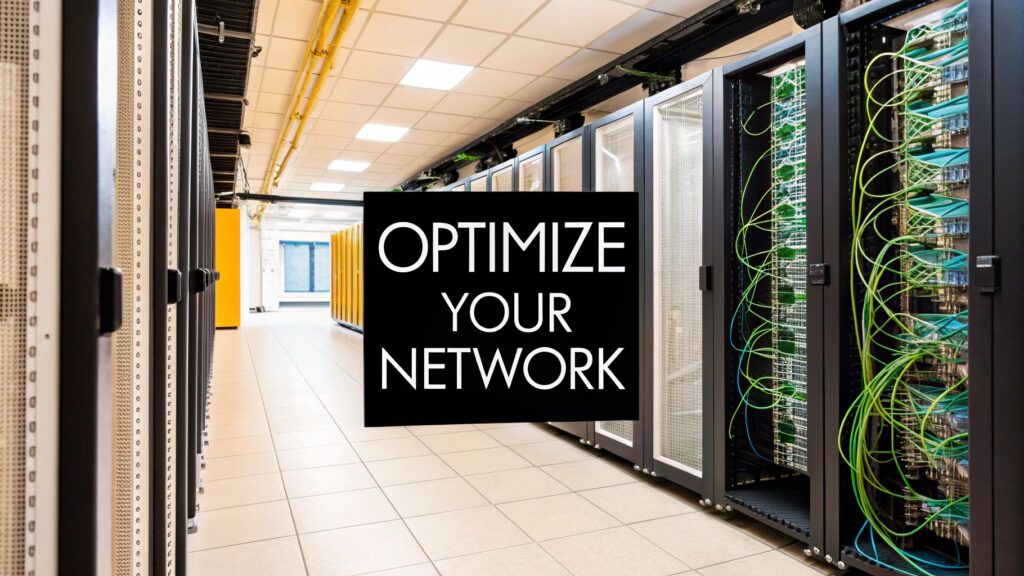
Building a Solid Foundation: Choosing the Right Network Infrastructure Solution
A reliable network is crucial for business success. This listicle identifies ten leading top network infrastructure solutions in Dubai to solve connectivity, performance, and security challenges. Quickly compare offerings from FSI Technology, Cisco, Juniper Networks, HPE Aruba, Extreme Networks, Fortinet, Dell EMC, Huawei, Ubiquiti, and VMware NSX, empowering you to choose the best network infrastructure solution for your organization’s needs in 2025. Learn about the pros and cons of each and make an informed decision.
1. FSI Technology: Your Premier Cisco Partner for Network Infrastructure Solutions in the UAE
For businesses in the UAE seeking robust and reliable network infrastructure solutions, FSI Technology stands out as a leading Cisco solution provider. With over two decades of experience, FSI offers a comprehensive suite of Cisco networking products and services tailored to the specific needs of organizations across various sectors. Whether you’re a corporate IT department, a telecom provider, or a data center manager, FSI’s expertise can help you build a secure and future-ready network.
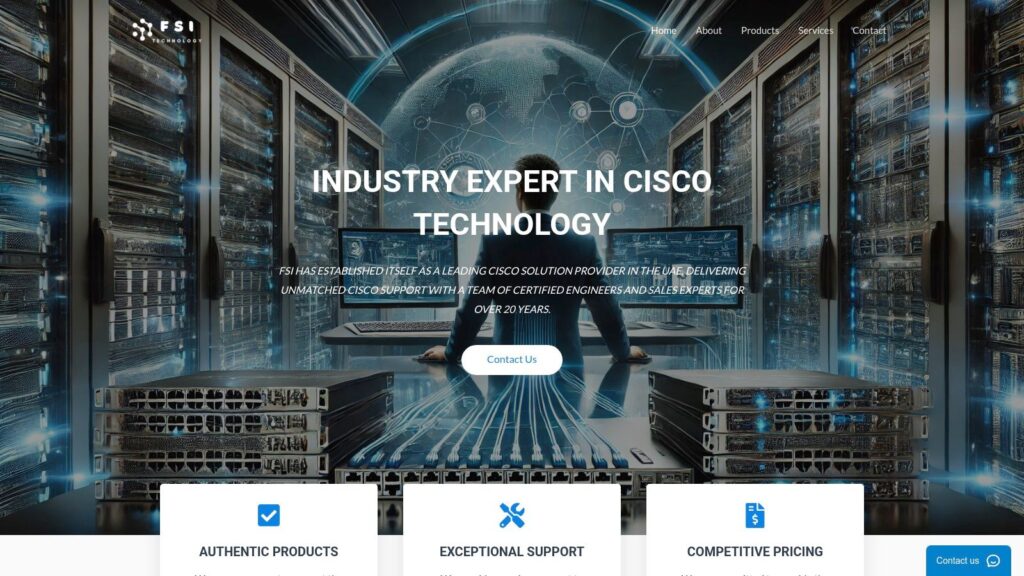
FSI’s strength lies in its comprehensive approach to network infrastructure solutions. They provide a wide range of authentic Cisco products, including routers, switches, security appliances, and unified communication systems. This extensive inventory ensures you can find the right equipment to meet your specific technical requirements, whether you are building a new network or upgrading an existing one.
Their certified engineers offer expert guidance throughout the entire process, from initial product selection and configuration to deployment and ongoing 24/7 support, 365 days a year. This end-to-end service minimizes downtime and ensures seamless network operations, vital for business continuity in today’s fast-paced environment. FSI has a proven track record of successful network design, deployment, and complex configuration projects across the UAE, solidifying their position as a trusted partner for demanding network infrastructure projects.
For businesses operating in the UAE, having a local partner with deep understanding of the market is essential. FSI Technology’s strong presence in Dubai and the wider UAE makes them readily accessible for support and collaboration. Their customer-centric approach ensures your network infrastructure solutions are not just implemented, but optimized for performance and security. They focus on building strategic partnerships, allowing them to understand your business goals and tailor their services accordingly. This commitment to long-term collaboration contributes significantly to their reputation for reliability and excellence.
Features & Benefits:
- Comprehensive Cisco Portfolio: Access to a complete range of Cisco networking products, ensuring a one-stop shop for all your Cisco needs.
- Expert Guidance: Certified engineers provide support at every stage, from design and configuration to deployment and maintenance.
- 24/7 Support: Uninterrupted support minimizes downtime and ensures consistent network performance.
- Competitive Pricing: FSI offers competitive pricing on their Cisco products and services, ensuring value for your investment.
- Local Expertise: Deep understanding of the UAE market and its unique challenges allows for tailored solutions.
Pros:
- Over 20 years of specialized experience as a trusted Cisco solution provider in the UAE
- Certified team offering expert guidance and premium after-sales support 24/7, 365 days
- Wide and authentic Cisco product inventory
- Competitive pricing
- Proven track record of successful deployments
Cons:
- Primary focus on Cisco products, limiting options outside the Cisco ecosystem
- Detailed pricing available upon inquiry
Website: https://fsi.ae
FSI Technology deserves its place on this list due to its proven expertise, comprehensive services, and strong commitment to customer satisfaction. While their focus is primarily within the Cisco ecosystem, their in-depth knowledge and experience make them a top choice for businesses in the UAE looking for reliable and high-performing network infrastructure solutions built on Cisco technologies. Contact FSI today to discuss your specific needs and receive a tailored quote.
2. Cisco Networking Solutions
Cisco is a cornerstone in the network infrastructure solutions landscape, offering a comprehensive suite of products and services designed to power networks of all sizes, from small businesses in the AE region to global enterprises. Their portfolio encompasses routers, switches, wireless systems, security appliances, and much more, providing a one-stop shop for building and managing robust, secure, and scalable networks. Cisco’s commitment to innovation is evident in their focus on intent-based networking, enabling automation and intelligent management across the entire network infrastructure. This makes them a strong contender for businesses seeking powerful and adaptable network solutions.
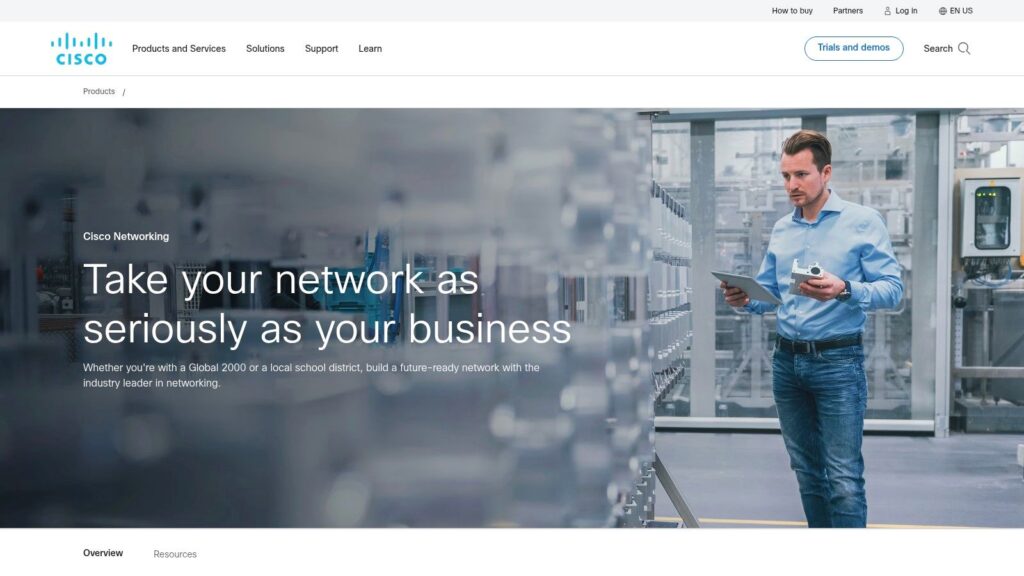
Features and Benefits:
- Integrated Security: Cisco prioritizes security by integrating it across all network components, offering robust protection against evolving threats. This is crucial for businesses in the AE region, where cybersecurity concerns are paramount.
- Intent-Based Networking (IBN): IBN simplifies network management by automating tasks and allowing administrators to define network policies based on business intent. This boosts efficiency and reduces manual configuration errors.
- Software-Defined Networking (SDN): Cisco’s SDN solutions provide centralized control and programmability, enabling greater agility and flexibility in network management.
- Comprehensive Hardware Portfolio: From powerful core routers and switches to advanced wireless access points, Cisco offers a wide range of hardware to suit diverse network infrastructure needs. This is particularly valuable for telecommunication service providers and data center managers in the AE region experiencing rapid growth.
- Network Management Tools: Tools like Cisco DNA Center provide comprehensive visibility and control over the network, streamlining management and troubleshooting.
Practical Applications and Use Cases in the AE Region:
- Building high-performance networks for large enterprises and government organizations: Cisco’s robust solutions can handle the demanding requirements of large-scale networks in the AE region.
- Securing critical infrastructure: Cisco’s integrated security features are essential for protecting sensitive data and systems in sectors like finance and healthcare.
- Enabling digital transformation initiatives: Cisco’s SDN and IBN capabilities support the agile and flexible network infrastructure needed for cloud computing, IoT, and other digital initiatives.
- Supporting the growth of smart cities: Cisco’s solutions can power the connected infrastructure required for smart city applications in the AE region.
Pricing and Technical Requirements:
Cisco’s pricing varies widely depending on the specific products and services chosen. While generally considered a premium option, the investment is often justified by the reliability and performance offered. Technical requirements also vary depending on the solution, but typically involve compatible hardware and software, as well as trained personnel for implementation and management. Contacting Cisco directly or a certified partner is recommended for detailed pricing and technical specifications based on your specific needs.
Pros:
- Industry-leading reliability and performance.
- Extensive ecosystem of compatible products and partners.
- Robust technical support and documentation.
- Regular security updates and patches.
Cons:
- Higher price point than many competitors.
- Complex licensing models.
- Steep learning curve for administrators.
- Some products require subscription-based licensing.
Implementation and Setup Tips:
- Engage with a Cisco certified partner for design and implementation assistance.
- Invest in training for your IT staff to effectively manage and utilize Cisco solutions.
- Plan for ongoing maintenance and support.
Comparison with Similar Tools:
While other vendors offer network infrastructure solutions, Cisco stands out with its comprehensive portfolio, integrated security focus, and advanced features like IBN and SDN. Competitors like Juniper Networks and Huawei offer similar solutions, but Cisco’s extensive ecosystem and robust support often make them the preferred choice for enterprise-grade deployments.
Website: https://www.cisco.com/c/en/us/solutions/enterprise-networks/index.html
Cisco Networking Solutions deserve their place on this list because they provide a comprehensive, reliable, and secure foundation for modern network infrastructures in the AE region and beyond. While the cost may be higher, the long-term benefits in terms of performance, security, and scalability often make it a worthwhile investment for organizations seeking best-in-class network infrastructure solutions.
3. Juniper Networks
Juniper Networks is a leading provider of high-performance network infrastructure solutions, carving its niche by focusing on scalability, security, and simplified operations. This makes them a compelling choice for organizations in the AE region looking to build robust and future-proof networks. Their comprehensive portfolio, encompassing routing, switching, security, and software-defined networking (SDN) products, addresses the complex needs of service providers, large enterprises, and even some medium-sized businesses with demanding network requirements. If your organization prioritizes rock-solid reliability and advanced security, Juniper Networks deserves serious consideration among your network infrastructure solutions.
Juniper’s strength lies in its ability to deliver exceptional performance in high-traffic environments. This is particularly relevant in the rapidly growing digital landscape of the AE region, where businesses are facing increasing demands on their networks. Their Junos OS, a consistent operating system across their product line, simplifies management and reduces operational complexity. This consistent architecture simplifies troubleshooting and allows network engineers to manage a diverse range of devices with a unified skillset.
Key Features and Benefits:
- AI-driven Enterprise Network Solutions: Juniper uses AI to optimize network performance, predict and prevent potential issues, and automate various network management tasks. This proactive approach can significantly reduce network downtime and improve operational efficiency. Want to minimize the risks of downtime?
- Junos OS: This powerful and versatile operating system provides a consistent experience across all Juniper devices, streamlining management and reducing the learning curve for network administrators.
- High-Performance Routing and Switching Platforms: Juniper offers a range of high-performance routing and switching platforms designed to handle the most demanding traffic loads. These platforms are ideal for large enterprises, service providers, and data centers requiring high availability and low latency.
- Advanced Security Features with SRX Series Firewalls: Juniper’s SRX series firewalls provide robust security features, including intrusion prevention, application security, and unified threat management, helping organizations protect their valuable data and maintain compliance.
- Contrail SDN Controller: This SDN controller automates network provisioning and management, enabling greater agility and flexibility in responding to changing business needs.
Pros:
- Exceptional performance for high-traffic environments
- Consistent operating system across product lines
- Strong security capabilities
- Open architecture that supports third-party integrations
Cons:
- Smaller market share and ecosystem than Cisco (though still substantial, especially in specific sectors)
- Higher initial learning curve for Junos OS (offset by long-term management efficiency)
- Premium pricing (reflecting the high performance and advanced features)
- Fewer products specifically tailored for small business needs (focus is primarily on enterprise-grade solutions)
Implementation and Setup:
Implementing Juniper Networks solutions typically involves working with certified partners or Juniper professional services. Their solutions often require specialized knowledge of Junos OS and network design principles. While the initial setup may be more involved than some competitors, the long-term benefits of a streamlined and highly secure network outweigh the initial investment.
Comparison with Similar Tools:
While Cisco holds a larger market share, Juniper often excels in specific areas like service provider networks and high-performance routing. Choosing between the two depends on specific needs and priorities. If you prioritize performance and security in a high-traffic environment, Juniper may be the better choice.
Pricing and Technical Requirements:
Pricing for Juniper Networks solutions varies depending on the specific products and services required. It’s best to contact Juniper directly or a certified partner for detailed pricing information. Technical requirements will also depend on the specific solution implemented, but typically involve compatible hardware and sufficient network infrastructure to support the chosen products.
4. HPE Aruba Networks
HPE Aruba Networks offers comprehensive network infrastructure solutions tailored for diverse needs, from small businesses to large enterprises. They stand out with a strong focus on wireless technologies, making them a particularly good fit for organizations with a significant mobile workforce or those embracing BYOD (Bring Your Own Device) policies. Furthermore, their edge computing capabilities and cloud-managed networking options provide the flexibility and scalability needed in today’s dynamic business environments. Aruba’s solutions are designed to create unified wired and wireless networks, simplifying management and enhancing user experience. This combination of features makes Aruba a powerful contender within the network infrastructure solutions landscape.
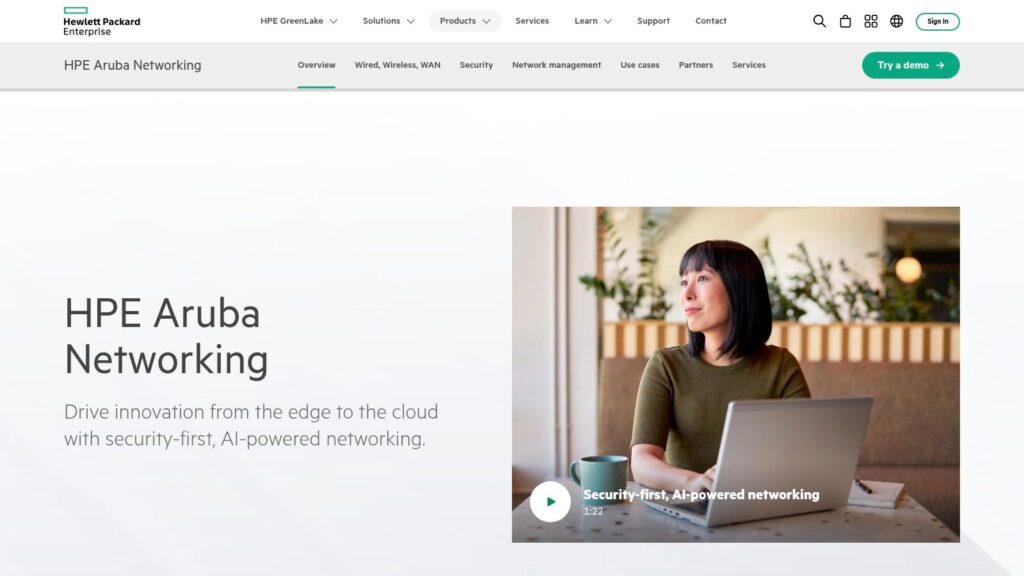
A core component of Aruba’s offering is the Aruba ESP (Edge Services Platform). This platform leverages AI-powered insights and automation to streamline network operations, proactively identify and resolve issues, and optimize performance. For instance, AI-powered analytics can predict and prevent network congestion, ensuring consistent connectivity for critical applications. This is particularly valuable in the AE region, where businesses are increasingly reliant on cloud services and real-time data exchange.
Aruba’s portfolio includes a wide range of hardware and software, including:
- Switches: From basic access switches to high-performance core switches, Aruba offers a variety of options to fit different network sizes and requirements.
- Access Points (APs): Aruba’s Wi-Fi 6/6E APs provide high-speed wireless connectivity with enhanced security features, ideal for supporting demanding applications and high-density environments.
- Controllers: Aruba controllers centralize the management of multiple APs, simplifying configuration and deployment, particularly valuable for large and geographically dispersed networks.
- Network Management Software: Aruba Central provides a cloud-based platform for managing and monitoring the entire network infrastructure, enabling simplified operations and remote troubleshooting.
Features that differentiate Aruba within the network infrastructure solutions market include:
- Aruba ESP: Provides AI-powered insights, automation, and security for enhanced network management.
- Zero-Trust Security Framework: Enhances network security by verifying every user and device attempting to access network resources.
- Cloud-Managed Networking Options: Offers flexible deployment and management options with cloud-based control and visibility.
Pros:
- Strong wireless networking capabilities: Aruba’s expertise in wireless technology makes it a strong choice for organizations with significant wireless needs.
- Intuitive management interfaces: Aruba’s management tools are designed for ease of use, simplifying network administration.
- Good balance of performance and cost: Aruba offers competitive pricing for its feature-rich solutions.
- Flexible deployment options: Supports both on-premises and cloud-managed deployments, providing flexibility for different business needs.
Cons:
- Some advanced features require premium licensing: Unlocking the full potential of Aruba ESP and other advanced features often requires additional licensing costs.
- Integration with non-Aruba equipment can be challenging: While interoperability is possible, integrating Aruba solutions with existing non-Aruba infrastructure can require additional configuration and expertise.
- Less comprehensive routing solutions compared to competitors: While Aruba offers routing capabilities, some competitors offer more advanced and feature-rich routing solutions.
Implementation/Setup Tips:
- Engage with an Aruba partner or certified expert for complex deployments.
- Leverage Aruba’s online resources and documentation for configuration and troubleshooting.
- Plan your network design carefully, considering factors like bandwidth requirements, security needs, and scalability.
While pricing varies depending on specific requirements and deployment models, contacting an Aruba sales representative or partner is recommended for detailed pricing information. Technical requirements will also vary based on the chosen solutions and can be found in Aruba’s product documentation. For more information, visit the official Aruba Networks website:
5. Extreme Networks: A Cloud-Driven Network Infrastructure Solution
Extreme Networks offers a comprehensive suite of end-to-end, cloud-driven network infrastructure solutions designed for flexibility, adaptability, and security. This makes them a compelling option for organizations looking to modernize their network infrastructure and streamline management. Their portfolio covers switching, routing, wireless access, and network management tools, all with a strong emphasis on automation and analytics. This focus allows businesses to simplify operations, improve network performance, and gain valuable insights into network behavior. Extreme Networks is particularly well-suited for organizations seeking a unified cloud management experience and robust analytics capabilities.
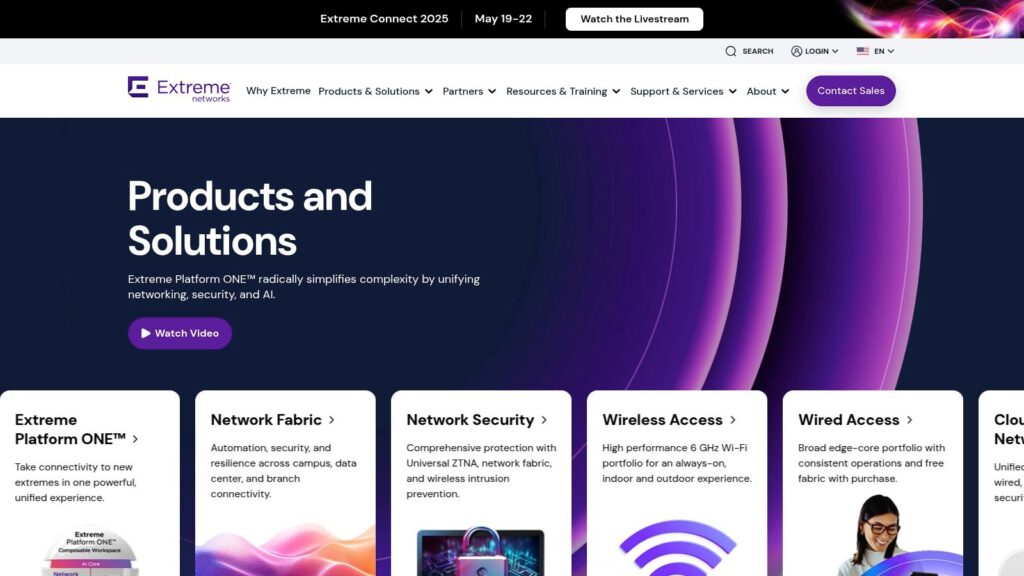
For corporate IT departments in the AE region, managing complex network infrastructure can be challenging. Extreme Networks simplifies this with ExtremeCloud IQ, a unified cloud management platform. This centralized platform allows administrators to manage the entire network – from switching and routing to wireless access points – from a single pane of glass. This simplifies tasks like configuration, monitoring, and troubleshooting, freeing up valuable IT resources.
Extreme Networks’ Fabric networking technology simplifies network connectivity by automating configuration and provisioning. This is particularly beneficial for data center managers and telecom service providers dealing with high-density deployments. The ML/AI-powered network analytics provide deep visibility into network traffic and performance, enabling proactive identification and resolution of potential issues. For business owners and executives, these analytics translate to improved network uptime and enhanced operational efficiency. Specifically, these analytics can help identify bottlenecks, optimize bandwidth allocation, and enhance security posture.
While pricing information isn’t readily available publicly, Extreme Networks is known to offer competitive pricing for enterprise features, making it a viable option for businesses of all sizes. Technical requirements vary depending on the specific solutions implemented, but their universal hardware platforms with flexible licensing offer deployment flexibility. This approach allows organizations to scale their network infrastructure according to their needs and budget, maximizing their return on investment.
Implementation Tips:
- Phased Approach: When migrating to Extreme Networks solutions, consider a phased approach, starting with a pilot deployment in a non-critical area.
- Legacy Integration: Be aware of potential integration challenges with legacy systems. Engage Extreme Networks or a certified partner to ensure a smooth transition.
- Training: Invest in training for your IT staff to maximize the benefits of ExtremeCloud IQ and other advanced features.
Comparison: While Cisco and Aruba dominate the market, Extreme Networks offers a compelling alternative with strong cloud management and analytics capabilities. Their automated campus and data center solutions are particularly competitive.
Pros:
- Simplified cloud management across the entire network (ExtremeCloud IQ)
- Strong analytics and visibility capabilities (ML/AI-powered)
- Competitive pricing for enterprise features
- Good support for network automation
Cons:
- Smaller market presence than some competitors
- Potential integration challenges with legacy systems
- Product portfolio inconsistencies due to acquisitions
Website: https://www.extremenetworks.com/solutions/
Extreme Networks deserves its place on this list of network infrastructure solutions because of its robust cloud management capabilities, advanced analytics, and focus on automation. These features are crucial for modern networks, particularly for organizations in the AE region experiencing rapid digital transformation. Their commitment to innovation and customer support further strengthens their position as a valuable partner for businesses seeking reliable and future-proof network infrastructure solutions.
6. Fortinet Security Fabric: Security-Driven Network Infrastructure Solutions
For organizations prioritizing robust security within their network infrastructure, Fortinet Security Fabric offers a compelling solution. This platform tightly integrates networking and security functions, providing comprehensive protection against evolving cyber threats. This makes it a particularly relevant choice for businesses in the AE region, where cybersecurity is paramount. Learn more about Fortinet Security Fabric. Fortinet deserves its place on this list of top network infrastructure solutions because it offers a truly converged approach, simplifying management and enhancing overall security posture.
Fortinet’s portfolio, built around the FortiGate next-generation firewall, includes a range of interconnected components. These include switches, wireless access points, and centralized management tools, all working together under the umbrella of the Fortinet Security Fabric. This interconnectedness allows for unified threat management and simplifies network administration.
Features and Benefits:
- Integrated Security and Networking: Unlike traditional setups where security is added as an afterthought, Fortinet bakes security into every aspect of the network. This integration provides a more proactive and effective defense against intrusions.
- FortiOS Unified Operating System: A single operating system, FortiOS, powers all Fortinet devices. This consistency simplifies management, training, and troubleshooting, allowing IT teams to manage the entire network infrastructure from a single pane of glass.
- SD-WAN Capabilities: Fortinet integrates SD-WAN functionality directly into its security appliances. This allows for flexible and secure connectivity across multiple locations, optimizing network performance and reducing costs, a key advantage for businesses with distributed operations in the AE region.
- Advanced Threat Protection: Fortinet’s Security Fabric offers advanced threat protection services, including intrusion prevention systems (IPS), sandboxing, and malware analysis, protecting against sophisticated cyberattacks.
- Single-Pane-of-Glass Management: Fortinet’s centralized management tools provide a comprehensive overview of the entire network, simplifying tasks like policy enforcement, device monitoring, and threat response.
Pros:
- Strong security features integrated with networking: Fortinet’s primary focus on security makes it a top choice for organizations looking for comprehensive protection.
- Good performance-to-price ratio: Fortinet offers competitive pricing, particularly considering the extensive security features included.
- Simplified management of security and network functions: The unified platform and single operating system streamline management and reduce complexity.
- Comprehensive threat intelligence: Fortinet’s threat intelligence feeds provide up-to-date information on emerging threats, enabling proactive defense.
Cons:
- Primary focus on security may limit some pure networking features: While Fortinet offers a robust networking platform, some advanced networking functionalities may be less developed compared to vendors specializing solely in networking.
- Advanced features often require subscription licenses: Some of the more advanced security features require additional licensing, which can add to the overall cost.
- Management interface can be complex for new users: While powerful, the management interface can be challenging for users unfamiliar with Fortinet’s ecosystem.
Pricing and Technical Requirements:
Pricing for Fortinet Security Fabric solutions varies depending on the specific components and required licenses. Contacting a Fortinet partner or reseller in the AE region is recommended for tailored pricing and technical requirements based on your organization’s needs.
Implementation and Setup Tips:
- Engage with a certified Fortinet partner: Working with a certified partner can streamline the deployment process and ensure proper configuration.
- Develop a comprehensive security policy: Clearly define your organization’s security requirements and map them to Fortinet’s security features.
- Invest in training: Proper training for your IT staff is crucial for effectively managing and utilizing the Fortinet Security Fabric.
Comparison with Similar Tools:
Compared to other network infrastructure solutions like Cisco or Palo Alto Networks, Fortinet differentiates itself with its tightly integrated security focus and competitive pricing. While Cisco offers a broader range of networking features, Fortinet’s security-driven approach is a major advantage for organizations prioritizing cybersecurity. Palo Alto Networks also offers advanced security, but often at a higher price point than Fortinet.
Website: https://www.fortinet.com/solutions/enterprise-midsize-business/security-driven-networking
7. Dell EMC Networking
Dell EMC Networking offers a robust suite of network infrastructure solutions designed for diverse environments, from enterprise networks and data centers to campus deployments. Their commitment to open networking, scalability, and efficiency makes them a compelling choice for organizations seeking flexible and adaptable network infrastructure. This approach allows businesses to leverage multi-vendor environments, avoiding vendor lock-in and promoting interoperability. Specifically in the AE region, where businesses are increasingly adopting cloud-based solutions and demanding high-performance networks, Dell EMC’s focus on open standards and scalability makes it an attractive option.
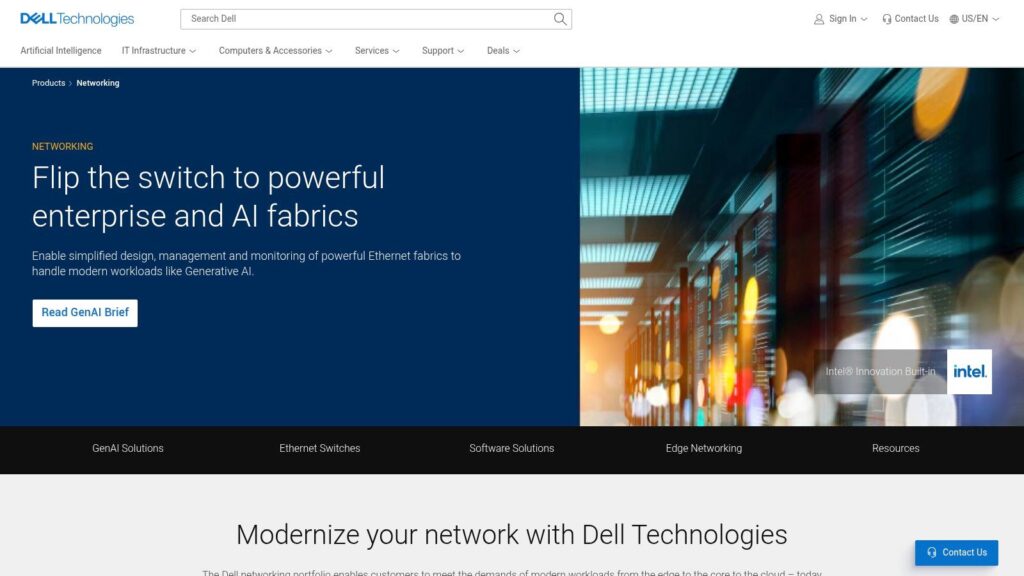
Dell EMC’s portfolio encompasses a range of networking hardware including switches, routers, and software-defined networking (SDN) solutions. Their high-density data center switching solutions are particularly relevant for businesses experiencing rapid data growth, offering efficient and scalable network performance. For campus environments, Dell EMC provides simplified management tools, streamlining network administration and reducing operational overhead. A key differentiator for Dell EMC is their SmartFabric services, enabling automated deployment and simplifying network orchestration. This feature significantly reduces deployment time and complexity, a crucial benefit for IT teams in the fast-paced AE market. For example, a large enterprise in Dubai could leverage Dell EMC’s SmartFabric services to quickly deploy a new data center network, accelerating their time-to-market for new services.
Furthermore, Dell EMC’s tight integration with their server and storage infrastructure creates a synergistic ecosystem, optimizing performance and simplifying management for organizations already utilizing Dell EMC products. This seamless integration can be particularly beneficial for businesses seeking a unified IT infrastructure. Imagine a telecommunications provider in Abu Dhabi looking to upgrade their core network infrastructure. Choosing Dell EMC allows them to integrate their new network seamlessly with their existing Dell EMC servers and storage, simplifying management and enhancing overall performance.
While Dell EMC provides competitive pricing for enterprise-grade hardware and robust support options, it’s important to consider some potential drawbacks. Their end-to-end solution portfolio may not be as comprehensive as some networking-focused vendors. Additionally, their dedicated networking portfolio is smaller than that of pure networking companies. While their wireless offerings are continuously improving, they are generally considered less mature compared to some competitors. Careful consideration of these factors, alongside your specific needs, will ensure the best fit for your network infrastructure. Proper cable management is crucial for any server rack deployment; you can learn more about Dell EMC Networking and best practices in cable management for an efficient and organized setup.
Key features and benefits of choosing Dell EMC for your network infrastructure solutions include:
- Open Networking Architecture: Supporting multiple operating systems provides flexibility and avoids vendor lock-in.
- High-Density Switching: Ideal for data centers and high-bandwidth applications.
- Simplified Campus Networking: Streamlines management and reduces operational complexity.
- Integration with Dell EMC Ecosystem: Seamless integration with Dell servers and storage.
- SmartFabric Services: Automates deployment and simplifies network orchestration.
- Competitive Pricing: Enterprise-grade hardware at competitive price points.
Dell EMC Networking deserves a place on this list because of its commitment to open standards, its focus on scalability and efficiency, and its seamless integration with the broader Dell EMC ecosystem. This makes it a compelling choice for businesses in the AE region looking for adaptable and future-proof network infrastructure solutions. Visiting their website, https://www.delltechnologies.com/en-us/networking/index.htm, provides further detailed information about their offerings.
8. Huawei Enterprise Network Solutions
Huawei offers a compelling suite of network infrastructure solutions tailored to meet the diverse needs of modern enterprises, making it a worthy contender on this list. From robust routing and switching to advanced wireless technologies and software-defined networking (SDN), Huawei provides a comprehensive portfolio. Their focus on intelligence, simplicity, and openness is reflected in their flagship solutions: CloudCampus for campus networks, CloudFabric for data centers, and CloudWAN for wide area networks. These solutions deliver intelligent connectivity and aim to simplify network management while embracing open standards. This breadth of offerings makes them a viable option for businesses of all sizes in the AE region.
For data center environments, Huawei’s CloudEngine series switches provide high-performance and scalable networking capabilities. These switches are designed to handle the demanding workloads of modern data centers, supporting high-density virtualization, cloud computing, and big data analytics. The CloudFabric solution builds upon this foundation, offering an intelligent and automated data center network fabric.
Huawei also excels in wireless networking with its AirEngine Wi-Fi 6 solutions. These offer high-speed, low-latency wireless connectivity, crucial for supporting today’s mobile workforce and bandwidth-intensive applications. Coupled with their CloudCampus solution, businesses can deploy and manage secure and reliable wireless networks across their campuses.
A key differentiator for Huawei is its emphasis on AI-powered network automation. Their iMaster NCE platform leverages built-in AI to simplify network operations, automate tasks, and proactively identify and resolve potential issues. This intent-driven networking approach allows administrators to define desired network outcomes, and the system intelligently configures and optimizes the network accordingly.
Features:
- CloudEngine switches for data center networking
- Intent-driven network capabilities with built-in AI
- High-performance routing platforms
- AirEngine Wi-Fi 6 wireless solutions
- iMaster NCE network automation platform
Pros:
- Competitive pricing for enterprise features: Huawei often offers competitive pricing compared to other established vendors, making their solutions attractive for budget-conscious organizations.
- Comprehensive product portfolio: Huawei’s comprehensive range of products covers a wide spectrum of networking needs, allowing businesses to source their entire network infrastructure from a single vendor.
- Strong technical capabilities and performance: Huawei’s solutions are known for their strong technical capabilities and performance, especially in areas like 5G and AI.
- Integrated AI for network automation: The integration of AI into their network management platform simplifies operations and enhances network efficiency.
Cons:
- Limited market presence in some regions due to regulatory concerns: Huawei faces regulatory challenges in certain markets, which may impact availability and support.
- Security concerns in some countries: Security concerns raised by some governments may influence purchasing decisions.
- Less extensive partner ecosystem in certain markets: Compared to some competitors, Huawei’s partner ecosystem might be less developed in certain regions.
- Support quality can vary by region: Support quality and availability can vary depending on the specific region.
Implementation Tips:
When considering Huawei network infrastructure solutions, thorough planning and assessment of your specific requirements are essential. Collaborating with a qualified Huawei partner can help with design, implementation, and ongoing support. Learn more about Huawei Enterprise Network Solutions if you are considering implementing a structured cabling solution as part of your network infrastructure upgrade. Addressing potential security concerns and regulatory compliance early in the process is crucial, especially for organizations in sensitive sectors.
Website: https://e.huawei.com/en/solutions/business-needs/enterprise-network
While pricing and specific technical requirements can vary based on project scope, contacting Huawei or a certified partner will provide tailored information. Considering both the pros and cons, Huawei offers a powerful and potentially cost-effective suite of network infrastructure solutions, making it a strong option for businesses seeking comprehensive and intelligent connectivity. They are a particularly relevant choice in the AE region for businesses seeking a competitive edge in network infrastructure.
9. Ubiquiti Networks: Cost-Effective Network Infrastructure Solutions
Ubiquiti Networks, now rebranded as Ubiquiti Inc., offers a compelling suite of network infrastructure solutions ideal for businesses across the AE region, particularly those seeking enterprise-grade features without the enterprise-grade price tag. Their strength lies in providing robust, scalable solutions that are particularly well-suited for small to medium-sized deployments, making them a popular choice for businesses looking to optimize their network infrastructure investment. This cost-effectiveness combined with a powerful feature set firmly establishes Ubiquiti Networks’ place within this list of top network infrastructure solutions.
Ubiquiti’s UniFi platform is the cornerstone of their offering, providing a unified management interface for a diverse range of network components. This centralized management simplifies administration, allowing network engineers and IT departments to easily monitor, configure, and maintain their entire network infrastructure from a single dashboard. This streamlined approach reduces complexity and frees up valuable time and resources.
Key Features and Benefits:
- UniFi Network Controller: This centralized management software allows for seamless control and monitoring of all UniFi devices within a network. From configuring VLANs and managing wireless access points to analyzing network traffic and pushing firmware updates, the UniFi Network Controller puts you in command.
- Scalable Wireless Mesh Capabilities: Ubiquiti’s wireless access points offer robust mesh networking capabilities, enabling businesses to extend their Wi-Fi coverage seamlessly without running additional cables. This is particularly advantageous in environments with challenging layouts or where cabling is difficult.
- Enterprise Switches with Layer 3 Features: Ubiquiti offers a range of managed switches that provide advanced Layer 3 features such as VLANs, inter-VLAN routing, and static routing, giving businesses the flexibility and control they need to segment their network and optimize traffic flow.
- Integrated Security and Gateway Products: Ubiquiti’s security gateways offer robust firewall protection, intrusion prevention, and VPN capabilities, ensuring network security and enabling secure remote access.
- Zero-Touch Provisioning: Ubiquiti devices support zero-touch provisioning, allowing for rapid deployment and configuration. This drastically reduces setup time and simplifies the rollout of new network infrastructure.
Practical Applications & Use Cases in the AE Region:
- Hospitality: Hotels and resorts can leverage Ubiquiti’s solutions to provide seamless Wi-Fi coverage across their properties, manage guest access, and ensure network security.
- Education: Schools and universities can deploy Ubiquiti networks to support digital learning initiatives, manage student and faculty access, and provide reliable internet connectivity.
- Retail: Retail businesses can utilize Ubiquiti’s Wi-Fi solutions to enhance customer experience, track inventory, and manage point-of-sale systems.
- Small and Medium-Sized Businesses (SMBs): Ubiquiti’s cost-effective solutions are ideal for SMBs looking to implement robust network infrastructure without breaking the bank.
Pros:
- Exceptional Value for Feature Set: Ubiquiti provides a remarkable range of features at a fraction of the cost of traditional enterprise vendors.
- Intuitive Management Interface: The UniFi Network Controller is user-friendly and easy to navigate, even for those without extensive networking experience.
- No Recurring Licensing Costs for Most Products: Unlike some vendors, Ubiquiti does not charge recurring licensing fees for most of their products, further enhancing their value proposition.
- Seamless Integration Between Product Lines: Ubiquiti’s product lines are designed to work seamlessly together, simplifying network design and deployment.
Cons:
- Limited Enterprise-Grade Support Options: While community support is readily available, dedicated enterprise-grade support can be limited.
- Less Robust Hardware Compared to Premium Vendors: Ubiquiti’s hardware may not be as robust as that offered by some premium vendors, potentially impacting longevity in harsh environments.
- Firmware Updates Can Introduce Stability Issues: While infrequent, firmware updates can occasionally introduce stability issues. Careful planning and testing are recommended before applying updates.
- Limited Advanced Routing Capabilities: Ubiquiti’s routing capabilities are generally sufficient for SMBs but may not meet the demands of large enterprises with complex routing requirements.
Website: https://www.ui.com/networks/
Implementation/Setup Tips:
- Plan your network topology carefully before deploying Ubiquiti devices.
- Utilize the UniFi Network Controller for centralized management and configuration.
- Test firmware updates in a controlled environment before deploying them to your production network.
- Leverage the Ubiquiti community forums for support and troubleshooting.
Ubiquiti Networks offers a powerful and cost-effective solution for businesses seeking comprehensive network infrastructure solutions. While some limitations exist regarding enterprise-grade support and hardware robustness, the value proposition, intuitive management interface, and robust feature set make Ubiquiti a strong contender for a wide range of deployments in the AE region.
10. VMware NSX Data Center
VMware NSX Data Center is a leading software-defined networking (SDN) solution that revolutionizes network infrastructure management by virtualizing and securing your entire network. Unlike traditional hardware-centric approaches, NSX Data Center abstracts the network and security functions into a software layer, decoupling them from the underlying physical hardware. This allows for unprecedented flexibility and agility in provisioning, managing, and securing virtual networks, making it a powerful tool for organizations seeking robust and adaptable network infrastructure solutions. This approach makes it ideal for dynamic environments where rapid scaling and efficient resource allocation are crucial.
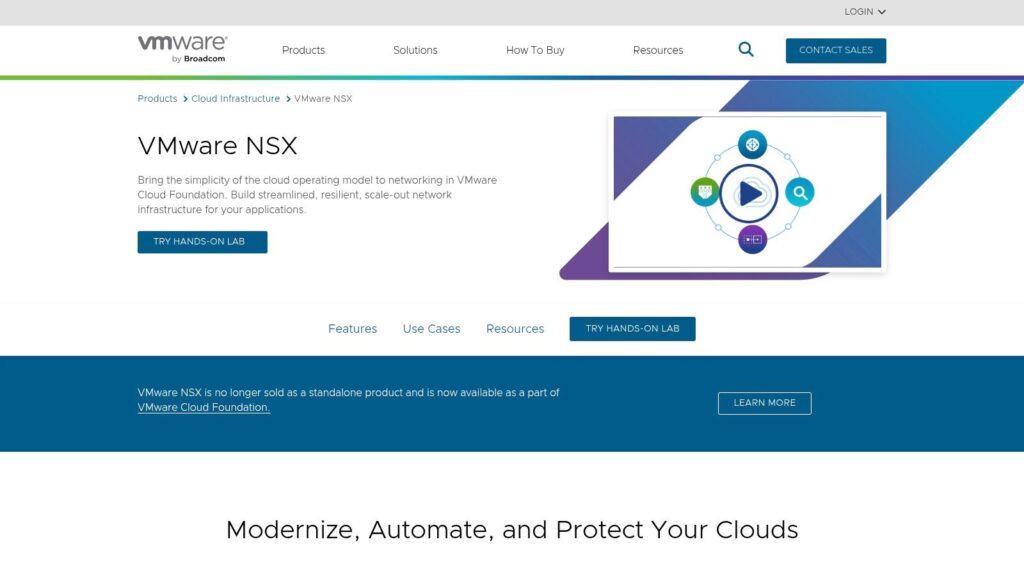
Specifically within the AE region, where digital transformation initiatives are rapidly advancing, NSX Data Center can be a key enabler for businesses seeking to modernize their IT infrastructure. Its ability to seamlessly integrate with existing hardware investments allows for a phased approach to SDN adoption, minimizing disruption while maximizing benefits. Furthermore, the advanced microsegmentation security capabilities offered by NSX Data Center address the growing concerns around cybersecurity threats, providing granular control and protection for critical applications and data.
Key features of VMware NSX Data Center include network virtualization and micro-segmentation, enabling granular security policies down to the workload level; software-defined security with a distributed firewall, offering comprehensive protection against both internal and external threats; automated network provisioning and management, simplifying complex tasks and reducing operational overhead; hardware-agnostic implementation, providing flexibility and choice in hardware selection; and seamless integration with cloud management platforms, facilitating hybrid cloud deployments. For a deeper understanding of infrastructure monitoring best practices, especially in the MEA region, Learn more about VMware NSX Data Center. This resource offers valuable insights into effectively managing and securing your IT infrastructure.
Pros:
- Reduced Hardware Dependency: Virtualizing the network reduces reliance on expensive and complex hardware, leading to significant cost savings in the long run.
- Advanced Microsegmentation Security: NSX Data Center allows for incredibly granular security policies, isolating workloads and limiting the impact of security breaches.
- Streamlined Network Provisioning and Management: Automating network tasks simplifies operations and reduces the time required for deployments and changes.
- Compatibility with Existing Investments: NSX Data Center works with your current network hardware, allowing for a gradual transition to SDN.
Cons:
- Complex Implementation: Setting up and configuring NSX Data Center requires specialized skills and expertise in virtualization and networking.
- High Upfront Investment: Licensing costs can be significant, particularly for larger deployments.
- VMware Ecosystem Requirement: NSX Data Center requires a VMware virtualization environment, potentially limiting its applicability for organizations using other virtualization platforms.
- Operational Learning Curve: Traditional network teams may require significant training to effectively manage and operate an SDN environment powered by NSX Data Center.
While pricing information for VMware NSX Data Center isn’t publicly available, it typically involves a licensing model based on the number of CPUs or virtual machines being managed. Contacting VMware or a certified partner is recommended to obtain a tailored quote. Technical requirements vary depending on the specific features being deployed but generally necessitate a VMware vSphere environment and sufficient compute and memory resources to support the NSX management components.
VMware NSX Data Center earns its place on this list as a powerful and comprehensive network infrastructure solution, especially suited for organizations already invested in the VMware ecosystem. Its ability to deliver advanced security, automated management, and hardware independence makes it a compelling choice for businesses looking to modernize their networks and embrace the benefits of software-defined networking. While the complexity and cost may present challenges, the long-term advantages of agility, scalability, and enhanced security can outweigh these considerations for many organizations.
Network Infrastructure Solutions Comparison
| Provider | Core Features & Technology | User Experience & Quality ★★★★☆ | Value & Pricing 💰 | Target Audience 👥 | Unique Selling Points ✨ |
| 🏆 FSI Technology | Authentic Cisco products; certified expert support | 24×7 premium support; proven regional success | Competitive pricing; tailored quotes | Corporate IT, network engineers, telecom | Expert guidance; strategic partnership; 20+ yrs |
| Cisco Networking Solutions | Intent-based networking; integrated security | Industry-leading reliability & performance | Premium pricing; complex licensing | Enterprise & large networks | Automation; extensive ecosystem |
| Juniper Networks | AI-driven, Junos OS, high performance routing | Strong security; consistent OS architecture | Premium pricing | Service providers, large enterprises | Open architecture; network automation |
| HPE Aruba Networks | AI-powered edge/cloud management; Wi-Fi 6/6E | Intuitive management; good cost-performance | Balanced pricing; some premium licenses | Wireless-focused; enterprises | Aruba ESP; zero-trust security |
| Extreme Networks | Cloud-driven, ML/AI analytics; fabric networking | Simplified cloud management; strong analytics | Competitive enterprise pricing | Adaptive networks; cloud-centric | ExtremeCloud IQ; automation |
| Fortinet Security Fabric | Security-driven networking; SD-WAN integration | Strong security features; good price-performance | Good value; subscription licenses needed | Security-focused enterprises | Unified management; threat intelligence |
| Dell EMC Networking | Open architecture; multi-vendor support | Strong integration with Dell infrastructure | Competitive pricing | Data centers; enterprise deployments | Open networking OS choice; SmartFabric services |
| Huawei Enterprise Network | AI-powered intent-driven; CloudCampus & CloudWAN | Strong technical capability; some regional gaps | Competitive pricing | Enterprise, campus, WAN | AI automation; comprehensive portfolio |
| Ubiquiti Networks | UniFi centralized management; mesh wireless | Intuitive UI; occasional firmware issues | Excellent value; no recurring licenses | SMBs, cost-sensitive enterprises | Disruptive pricing; zero-touch deployment |
| VMware NSX Data Center | Network virtualization; micro-segmentation | Advanced virtualization; high complexity | High upfront & licensing costs | Virtualized environments, cloud platforms | Hardware agnostic; software-defined security |
Connecting the Dots: Implementing Your Network Infrastructure Solution
Choosing the right network infrastructure solution is paramount for building a robust and future-ready network. This article explored the top 10 network infrastructure solutions of 2025, ranging from industry giants like Cisco and Juniper Networks to innovative solutions from Huawei and VMware. Key takeaways include the increasing importance of software-defined networking, the integration of AI for network optimization, and the critical role of robust security solutions like Fortinet Security Fabric. We also highlighted the diverse offerings available, from comprehensive suites like HPE Aruba Networks and Dell EMC Networking to specialized solutions like Ubiquiti Networks for specific use cases.
Selecting the optimal solution hinges on several factors. Carefully evaluate your organization’s specific needs, including bandwidth requirements, security concerns, scalability needs, and budget constraints. Consider your in-house technical expertise and the level of support required from your chosen vendor. Matching your needs to the strengths of a particular network infrastructure solution is key to a successful implementation. For instance, if your organization prioritizes advanced security features and centralized management, Fortinet Security Fabric might be a strong contender. If seamless integration with existing VMware environments is crucial, VMware NSX Data Center could be the ideal choice. The future of networking lies in harnessing these advanced technologies to create efficient, secure, and scalable network infrastructures.
In today’s dynamic digital landscape, making informed decisions about your network infrastructure is crucial for success. Navigating the complexities of these solutions can be challenging, especially in the fast-paced AE region. FSI Technology specializes in helping businesses like yours design, implement, and manage cutting-edge network infrastructure solutions, partnering with leading providers like those discussed in this article. Visit FSI Technology today to learn how we can help you build a connected ecosystem that empowers your business growth.
